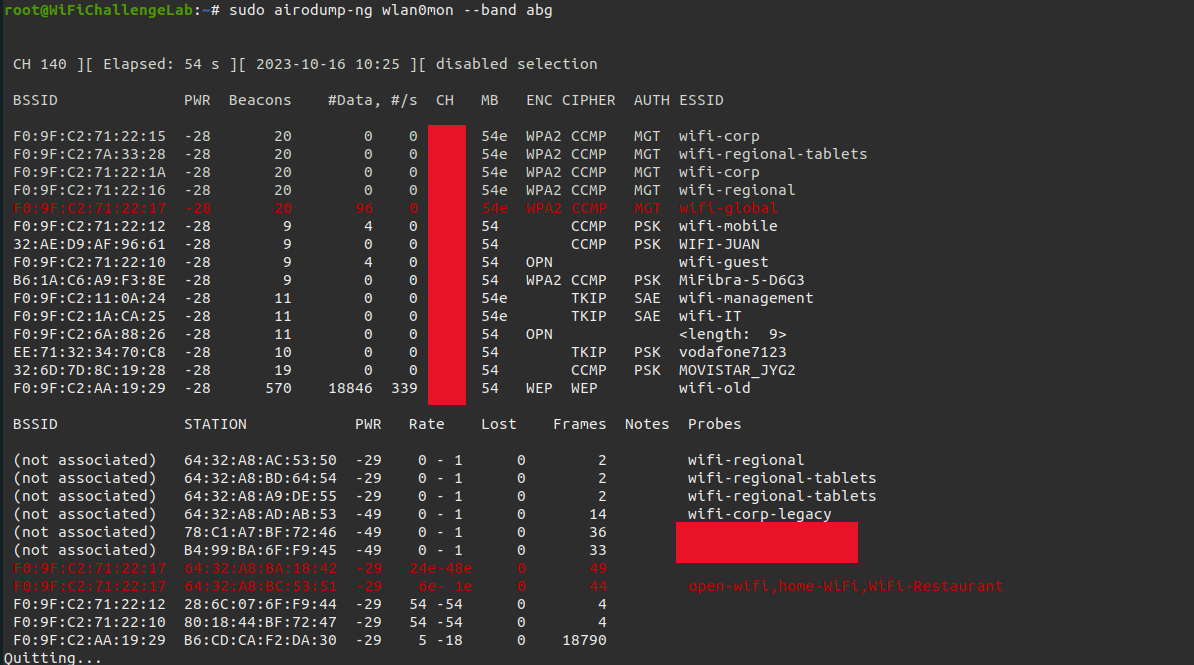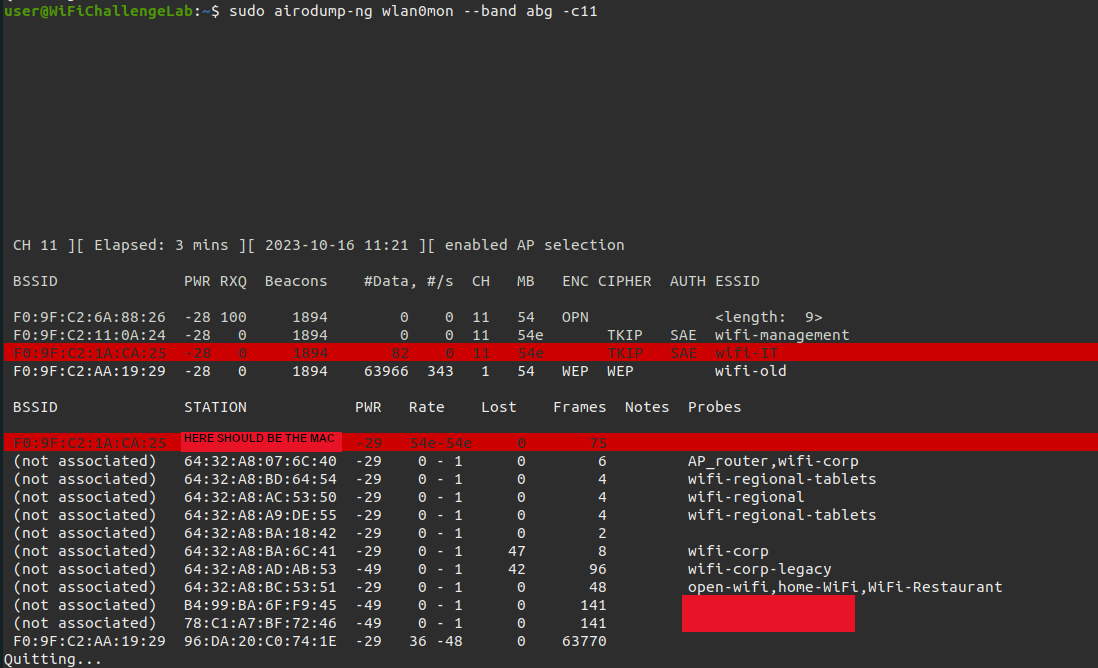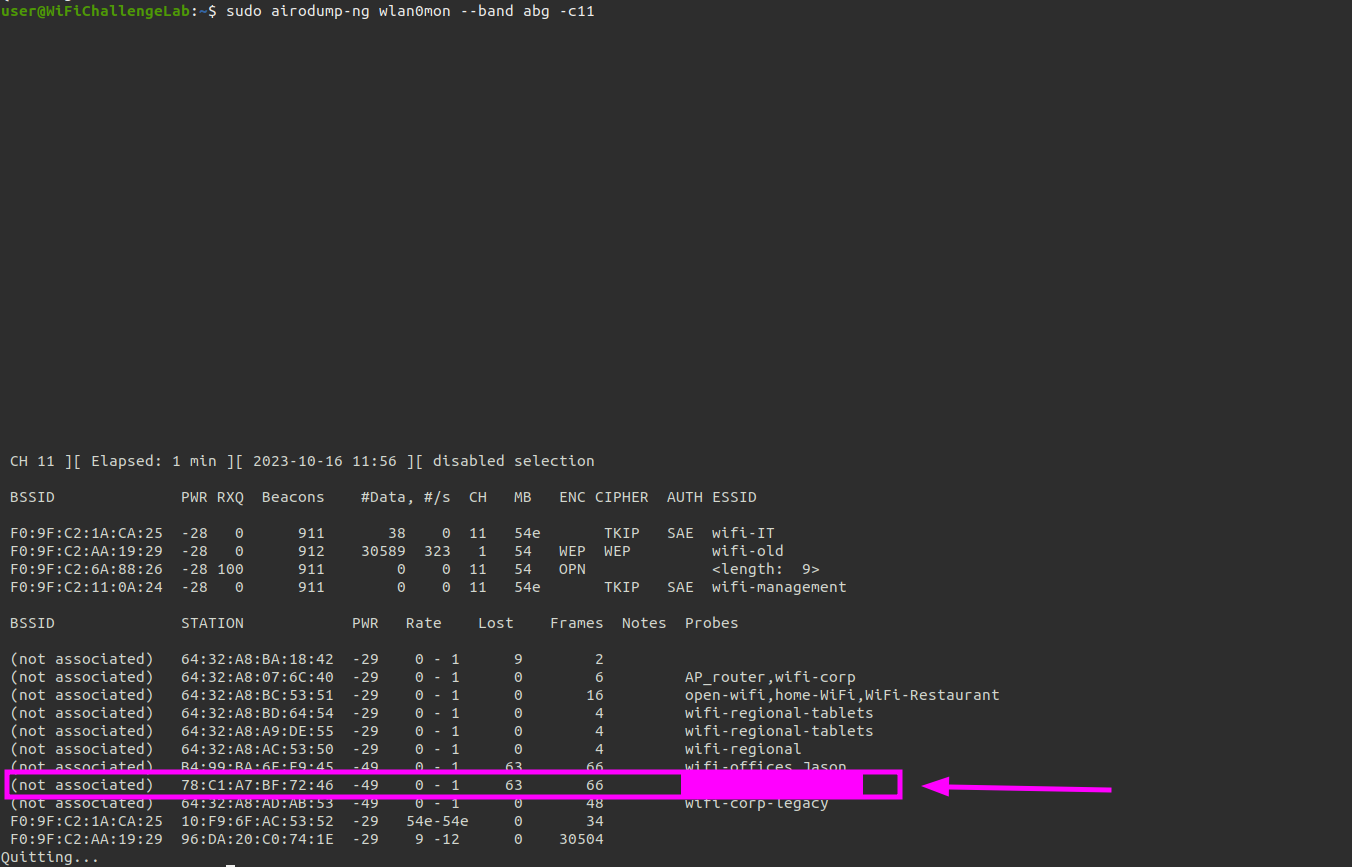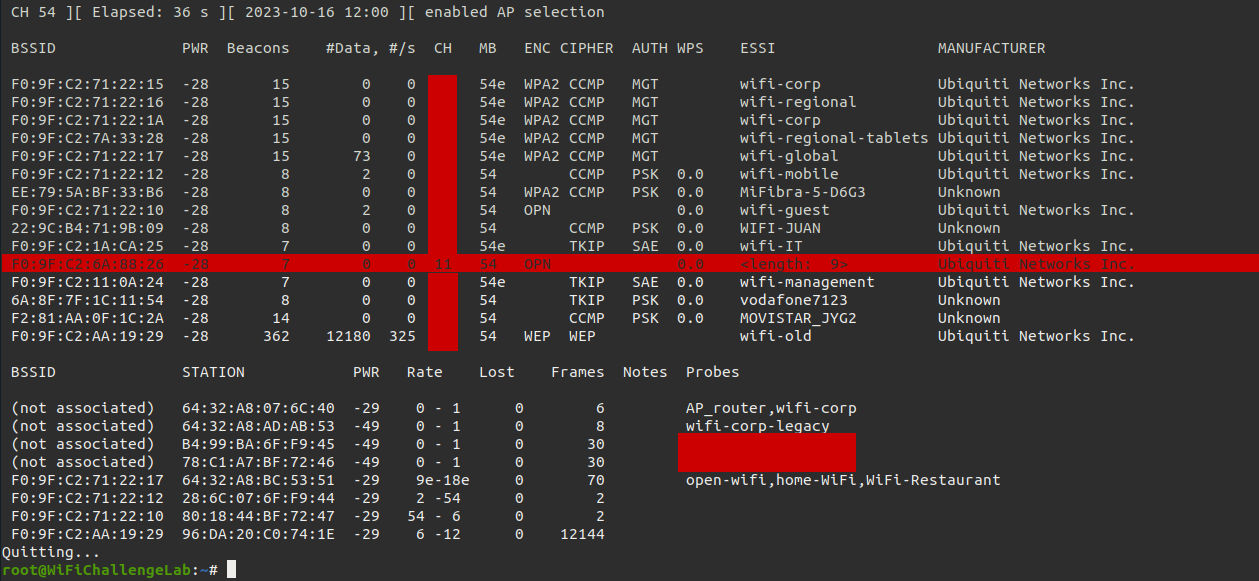A bit of WiFi recon
While preparing for OSWP I stumbled across WiFiChallengeLAB, where you can download a virtual machine with several WiFi networks. To start hacking a WiFi network you should do recon first to gather a bit of information.
Starting WiFi reconnaissance
Information such as SSID, BSSID, which channel is used, whether there are clients connected to a WiFi access point, etc. After all, you cannot hack a WiFi network without information. We can gather this information We may collect this information in various ways. In this post I will describe two that I used to identify a channel.
Identify the channel of an Access Point (Method 1)
Within the terminal you can enter the following command: nmcli dev wifi list
1
2
3
4
5
6
7
8
9
10
11
12
13
14
15
16
17
18
19
root@WiFiChallengeLab:~# nmcli dev wifi list
IN-USE BSSID SSID MODE CHAN RATE SIGNAL BARS SECURITY
F0:9F:C2:AA:19:29 wifi-old Infra XX 54 Mbit/s 100 ▂▄▆█ WEP
32:6D:7D:8C:19:28 MOVISTAR_JYG2 Infra XX 54 Mbit/s 100 ▂▄▆█ WPA2
B6:1A:C6:A9:F3:8E MiFibra-5-D6G3 Infra XX 54 Mbit/s 100 ▂▄▆█ WPA2
32:AE:D9:AF:96:61 WIFI-JUAN Infra XX 54 Mbit/s 100 ▂▄▆█ WPA2
F0:9F:C2:71:22:12 wifi-mobile Infra XX 54 Mbit/s 100 ▂▄▆█ WPA2
F0:9F:C2:71:22:10 wifi-guest Infra XX 54 Mbit/s 100 ▂▄▆█ --
EE:71:32:34:70:C8 vodafone7123 Infra XX 54 Mbit/s 100 ▂▄▆█ WPA2
F0:9F:C2:11:0A:24 wifi-management Infra XX 54 Mbit/s 100 ▂▄▆█ WPA3
F0:9F:C2:1A:CA:25 wifi-IT Infra XX 54 Mbit/s 100 ▂▄▆█ WPA2 WPA3
F0:9F:C2:6A:88:26 -- Infra XX 54 Mbit/s 100 ▂▄▆█ --
F0:9F:C2:71:22:1A wifi-corp Infra XX 54 Mbit/s 100 ▂▄▆█ WPA2 802.1X
F0:9F:C2:71:22:16 wifi-regional Infra XX 54 Mbit/s 100 ▂▄▆█ WPA2 802.1X
F0:9F:C2:7A:33:28 wifi-regional-tablets Infra XX 54 Mbit/s 100 ▂▄▆█ WPA2 802.1X
F0:9F:C2:71:22:17 wifi-global Infra XX 54 Mbit/s 100 ▂▄▆█ WPA2 802.1X
F0:9F:C2:71:22:15 wifi-corp Infra XX 54 Mbit/s 100 ▂▄▆█ WPA2 802.1X
It will show all information needed. I think a big advantage is that the security column indicates which security is being used. The highest and lowest are shown here, as with the WiFi-IT network (WPA2 WPA3). We could carry out a downgrade attack on this network. This will be discussed in another post.
Identify the channel of an Access Point (Method 2)
A second way to successfully obtain information can be achieved with airodump. Below I describe the steps that need to be taken.
First, we need to stop some unnecessary processes.
1
2
3
4
5
6
7
8
root@WiFiChallengeLab:~# sudo airmon-ng check kill
Killing these processes:
PID Name
573 wpa_supplicant
1012 ifplugd
After this we can put the network interface in monitor mode.
1
2
3
4
5
6
7
8
9
10
11
12
13
14
15
16
root@WiFiChallengeLab:~# sudo airmon-ng start wlan0
PHY Interface Driver Chipset
phy0 wlan0 mac80211_hwsim Software simulator of 802.11 radio(s) for mac80211
(mac80211 monitor mode vif enabled for [phy0]wlan0 on [phy0]wlan0mon)
(mac80211 station mode vif disabled for [phy0]wlan0)
phy1 wlan1 mac80211_hwsim Software simulator of 802.11 radio(s) for mac80211
phy2 wlan2 mac80211_hwsim Software simulator of 802.11 radio(s) for mac80211
phy3 wlan3 mac80211_hwsim Software simulator of 802.11 radio(s) for mac80211
phy4 wlan4 mac80211_hwsim Software simulator of 802.11 radio(s) for mac80211
phy5 wlan5 mac80211_hwsim Software simulator of 802.11 radio(s) for mac80211
phy6 wlan6 mac80211_hwsim Software simulator of 802.11 radio(s) for mac80211
phy60 wlan60 mac80211_hwsim Software simulator of 802.11 radio(s) for mac80211
Once the network interface is in monitor mode we can start airodump-ng to collect information.
1
sudo airodump-ng wlan0mon --band abg
Identify the MAC address of a client
A MAC address of a client can be useful if, for example, we need to perform a deauthenticate attack to capture a WPA handshake. During the reconnaissance we must therefore make notes of the MAC addresses that connect to our target (Access Point). WiFiChallensLAB has this as part of the challenges to identify a MAC address.
We’re starting to kill unnecessary processes again.
1
user@WiFiChallengeLab:~$ sudo airmon-ng check kill
After this we can activate the monitor mode for our network interface.
1
user@WiFiChallengeLab:~$ sudo airmon-ng start wlan0
We then need to identify the WiFi networks in the area again.
1
user@WiFiChallengeLab:~$ sudo airodump-ng wlan0mon --band abg
Because there are multiple WiFi networks, we can also specifically monitor a certain channel. This significantly reduces the number of WiFi networks in our overview.
1
user@WiFiChallengeLab:~$ sudo airodump-ng wlan0mon --band abg -c11
A client’s MAC address is displayed at the bottom of the screen. The MAC addresses found that communicate with our target (Access Point) must be added to our notes.
What is the probe of a client?
Devices with a WiFi network interface transmit probe requests to receive information about nearby WiFi networks and establish a WiFi connection. When an access point receives a probe request it will reply with a probe response to establish a connection. An attacker can look for a probes and try to create a rogue access point with that WiFi network name. One fo the recon challenges in WiFiChallengeLABs is to identify the probe requests. To identify the probes we can use the steps below.
First we have to kill some processes.
1
user@WiFiChallengeLab:~$ sudo airmon-ng check kill
Next we have to set the monitor mode on to the network interface.
1
user@WiFiChallengeLab:~$ sudo airmon-ng start wlan0
Now we should check nearby WiFi networks.
1
user@WiFiChallengeLab:~$ sudo airodump-ng wlan0mon --band abg
We can monitor on a specific channel as well. In this example we only monitor channel 11.
1
user@WiFiChallengeLab:~$ sudo airodump-ng wlan0mon --band abg -c11
The probes are shown at the bottom next to the workstations.
What is the ESSID of the hidden AP?
A hidden WiFi network is not really hidden. It takes an attacker a little more time to penetrate. In WiFiChallangeLabs there is a challenge where we have to find (and ultimately actually hack) a hidden WiFi network.
Because all networks start with a prefix of wifi-, we first create a new rockyou dictionary.
1
root@WiFiChallengeLab:~# cat ~/rockyou-top100000.txt | awk '{print "wifi-" $1}' > ~/wifi-rockyou.txt
We then kill unnecessary processes before putting the network interface in monitor mode.
1
user@WiFiChallengeLab:~$ sudo airmon-ng check kill
Once the processes have been killed we can put the network interface in monitor mode.
1
user@WiFiChallengeLab:~$ sudo airmon-ng start wlan0
Now we need to collect information about the hidden WiFi network. We have to know the MAC address of the hidden WiFi Access Point.
1
user@WiFiChallengeLab:~$ sudo airodump-ng wlan0mon --band abg
When we have the information required we should try to crack the hidden network name.
1
root@WiFiChallengeLab:~# mdk4 wlan0mon p -t F0:9F:C2:6A:88:26 -f wifi-rockyou.txt
Once we have the SSID name we can add it to our notes and use it to attack the network.




